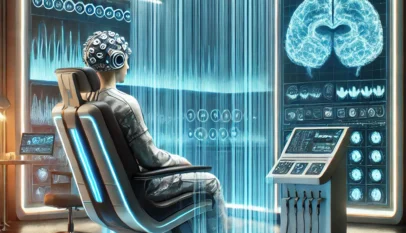TMS Therapy: Effective Treatment for Depression and Anxiety
TMS therapy, or Transcranial Magnetic Stimulation, has emerged as a promising alternative for those struggling with depression and anxiety when traditional treatments fall short. This non-invasive procedure uses magnetic fields to stimulate nerve cells in the brain, potentially reducing symptoms of mood disorders significantly. As awareness grows, more individuals are exploring TMS therapy as a viable option to improve their mental health.
The process is straightforward and involves repeated sessions, typically over several weeks. Many patients report experiencing minimal side effects compared to conventional medications, which can often come with a long list of undesirable reactions. This advantage makes TMS therapy an appealing choice for those who prioritize a treatment method with fewer complications.
As research continues to expand on the efficacy of TMS, it brings hope to numerous individuals seeking relief from persistent mental health issues. The potential for long-lasting benefits and the increasing number of clinics offering this service highlight a shift towards more innovative mental health treatments.
Understanding TMS Therapy
TMS therapy is a non-invasive treatment modality primarily used for depression. It involves targeted magnetic stimulation to specific areas of the brain. This section details the mechanisms of action, types of TMS, and comparisons with other treatment methods.
Mechanisms of Action
Transcranial Magnetic Stimulation (TMS) utilizes magnetic fields to stimulate nerve cells in the brain. It targets the prefrontal cortex, an area often associated with mood regulation.
During the procedure, a magnetic coil is placed near the scalp. When activated, it generates magnetic pulses that induce electrical currents in the targeted brain regions. This can enhance neuronal activity and promote plasticity, which may alleviate symptoms of depression.
Research suggests that TMS may influence neurotransmitter levels, including serotonin, dopamine, and norepinephrine. These chemicals play crucial roles in mood and emotion regulation.
Types of TMS
There are several types of TMS, each differing in technique and application. The most common type is Repetitive TMS (rTMS), which involves delivering repetitive magnetic pulses.
Deep TMS (dTMS) penetrates deeper brain structures. It uses a different type of coil, allowing for broader stimulation. This method is often chosen for conditions that may require more extensive brain engagement.
Theta Burst Stimulation (TBS) is another variation. It uses bursts of stimulation at specific intervals, potentially reducing treatment time while maintaining effectiveness. Each type may be chosen based on individual patient needs and specific conditions.
Comparing TMS to Other Treatments
TMS therapy is often compared to traditional antidepressant medications and psychotherapy. Unlike medications, TMS does not have systemic side effects like weight gain or sexual dysfunction.
While psychotherapies can also be effective, they typically require more time and patient involvement. TMS sessions are usually brief and administered in a clinical setting, with many individuals completing multiple sessions over several weeks.
The effectiveness of TMS may vary based on individual cases. Some patients may respond better to TMS than to other treatments, especially those who have not found relief from medications.
Clinical Applications and Efficacy
TMS therapy has shown promise in various clinical settings, particularly for mental health conditions and some neurological disorders. Its application in treating these issues highlights its potential effectiveness and patient benefits.
Depression Treatment
TMS therapy is primarily recognized for its effectiveness in treating major depressive disorder (MDD). It is typically utilized for patients who have not responded to traditional treatments such as medication and psychotherapy.
Research indicates that TMS can reduce depression symptoms significantly. A meta-analysis has shown response rates ranging from 30% to 60% among patients.
The therapy involves targeted magnetic stimulation to specific brain regions, primarily the prefrontal cortex. Sessions usually last about 20-40 minutes, with patients often experiencing minimal discomfort. Treatment courses may consist of 20 to 30 sessions, leading to sustained improvement in mood.
Anxiety Disorders
TMS therapy is also being explored for a variety of anxiety disorders. Although it is not yet widely approved specifically for anxiety, studies suggest it may benefit conditions like generalized anxiety disorder (GAD) and post-traumatic stress disorder (PTSD).
Clinical trials have shown promising results, indicating that TMS reduces anxiety symptoms and improves overall emotional regulation.
The mechanism may involve modulation of brain circuits associated with anxiety. Patients typically undergo therapy for 6 to 8 weeks, with sessions scheduled several times a week.
Neurological Conditions
Beyond mental health, TMS therapy has applications in treating neurological conditions such as migraine and chronic pain. Studies suggest TMS can effectively reduce the frequency and intensity of migraines.
The treatment seems to work by altering the excitability of cortical regions involved in pain perception. Research indicates a 30% reduction in migraine days for some patients after a course of TMS.
Additionally, TMS is being investigated for its effects on conditions like Parkinson’s disease, with early studies indicating potential benefits in motor function and daily living activities.
Safety profiles are generally favorable, making TMS a viable option for those seeking alternatives to medication.
Top Infant Care Services Near Me for Early Childhood Support
Finding reliable infant child care near you is essential for parents seeking a safe and nu…














